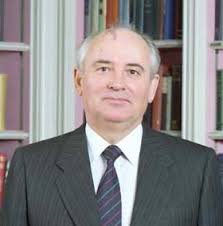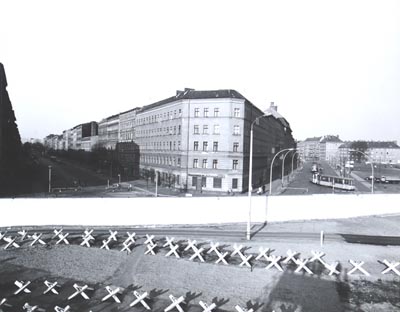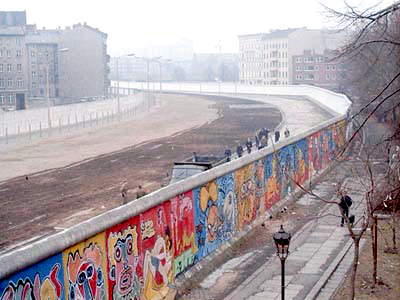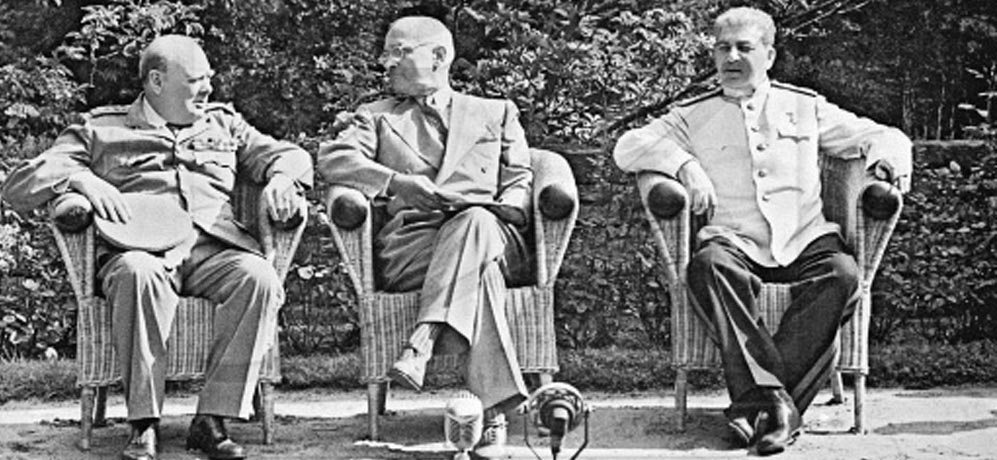
Mikhail Gorbachev was instrumental in the fall of the Berlin wall and the end of the cold war.

"The Anti Fascist Protection Barrier".

The Berlin wall was used as a canvas for many artists.

Yalta Conference
The Conference that the "Big Three", Churchill, Roosevelt and Stalin, held in Yalta (Crimea - former USSR) from 4 to February 11, 1945 is arguably one of the most celebrated events of the twentieth century diplomats. During the Cold War remained the idea that in Yalta there had been a division of the world between the Western powers and the USSR. The reality was not that.The "Big Three" met to coordinate their war plans at a time when the operations against the Axis powers had entered a decisive moment. Churchill, Roosevelt and Stalin tried to reach the broadest possible agreement on the sticking points separating them regarding the future of a Europe that is readily guessed liberated from Hitler's dictatorship.
The situation at the time of the Conference clearly favored Stalin. After impressive offensive of the Red Army in 1944, Soviet troops were 70 kilometers from Berlin and occupied virtually the entire Central and Eastern Europe. At the same time, maintaining the neutrality pact with Japan allowing Moscow to maintain a strong position in everything related to the Polish and German issues.
At this conference five main resolutions were agreed upon:
Germany would be demilitarized and divided into four occupation zones of the USSR, USA, Britain and France (including demand Churchill). It would be subject to heavy financial reparations and lose part of East Prussia and Pomerania, leaving its eastern border set on the line marked by the Oder and Neisse rivers. It was established that an international tribunal would judge the main Nazi war criminals. Which subsequently he led to the Nuremberg trials.
Poland would be "shifted" to the west, annexing the territories lost in eastern Germany and eastern ceding the territories that had been under Soviet rule after the pact German-Soviet non-aggression in 1939. The so-called Lublin Committee, consisting essentially Communists, they constitute the core of the future Polish government, but also will present the members of the pro-Western Polish provisional government based in London.
With respect to the Nations United, whose Charter was drafted and draft, agreed a compromise on the voting formula in the future Security Council, emphasizing the key role of the great victorious powers in the future organization of the peace.
Finally, it approved the so-called Declaration on liberated Europe where the "Big Three" committed to the reconstruction of Europe was made by democratic means constituting democratic governments broadly representative of all non-fascist elements of each nation. These governments should convene as soon as possible free elections that would allow the creation of governments emanating from the popular will.
It was the violation of these agreements by the Soviets which led to the division of Europe and what came to be called the "iron curtain". Subsequently, the US Republicans opposed Roosevelt and his legacy, and De Gaulle himself, outcast of the meeting, promoted the false idea that in Yalta division of Europe agreed in two spheres of influence, Western and Soviet.
Finally, with regard to the Far East a secret protocol by which to change the entry of the USSR in war with Japan within two or three months after the German defeat, the Soviet Union would recover all the lost territories it agreed after the Russo-Japanese War of 1905.
